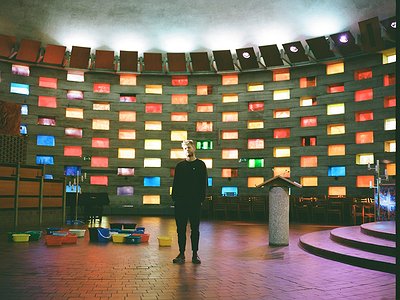Part 2
Can you talk about a breakthrough work, event or performance in your career? Why does it feel special to you? When, why and how did you start working on it, what were some of the motivations and ideas behind it?
There have been a couple of occasions that have felt important - I received two UK VMA nominations for a music video which was my first major effort at releasing music online. More than anything, this gave me the confidence to continue making music, and introduced me to many friends and industry folks that I still work with today. Hearing Lauren Laverne selecting one of my tracks for her ‘headphone moment’, live on the radio was a wonderful moment.
There are many descriptions of the ideal state of mind for being creative. What is it like for you? What supports this ideal state of mind and what are distractions? Are there strategies to enter into this state more easily?
I need to be inspired to aim for a certain sound. Often, I have to be able to hear and describe that sound to myself before I can begin. I find that my best work comes from having a very clear idea of what I want to achieve. In order to find what that is, my inspiration comes from reading, traveling, live music, and sharing recorded music with friends. Until then, I won’t make any music at all.
Music and sounds can heal, but they can also hurt. Do you personally have experiences with either or both of these? Where do you personally see the biggest need and potential for music as a tool for healing?
I hosted an event in New York with Miguel Atwood-Ferguson and his quartet at which they performed a 40-minute improvisation, responding to the surrounding construction noise, and sirens of police and fire trucks below us. It was unbelievable. There was a Q+A afterwards and he described his meditative process and dedication to self-improvement. You could feel the hypnosis of the audience. I think this format is both entertaining and enlightening equally, and I wish more musicians would speak freely about their art in this way.
There is a fine line between cultural exchange and appropriation. What are your thoughts on the limits of copying, using cultural signs and symbols and the cultural/social/gender specificity of art?
My personal view is that people should have the right to express themselves through their art. Others have a right to be offended, and should be able to express themselves in equal measure. People should be able to disagree - and crucially, have a conversation about why that offence has been caused. In my experience, it is a lack of education and therefore an inability to empathise that’s at the heart of questionable cultural exchange and appropriation.
Our sense of hearing shares intriguing connections to other senses. From your experience, what are some of the most inspiring overlaps between different senses - and what do they tell us about the way our senses work?
It’s combinations of the senses that are the most memorable. The reason I remember Soil & Pimp playing live in France so vividly 10 years ago, was because the moon rose above the sea horizon as they closed their show. Had there been only the music or only the visual it may have been like any other gig. Clearly one can evoke another too, as with Alzheimer’s, with music reviving memories for so many people. I’m excited by the notion of VR - many people seem to have given up on this idea but the potential for this still seems enormous to me.
Art can be a purpose in its own right, but it can also directly feed back into everyday life, take on a social and political role and lead to more engagement. Can you describe your approach to art and being an artist?
Universally, energy cannot be created, only transferred. I believe this is how creativity operates - you inhale it, and give it back through a format of your choosing. Art is the format itself in its own right, solely. That’s been my approach to creativity - social issues have not played a part in my process. However, recently the environment became too much of an issue for me to ignore, so Sun Songs looks at a dialogue with the environment. It’s a collaboration, the intention was for it to be an aural snapshot of the Sun’s energy. 30% of sales go to Giving Green, an evidence based climate emergency fund.
What can music express about life and death which other forms of art may not?
People have tremendous difficulty describing music - their feelings that come with discovering a new piece, or their nostalgia with playing an old favourite. It has an ethereal existence that seems to evade our description, it’s deeply personal as a result.





